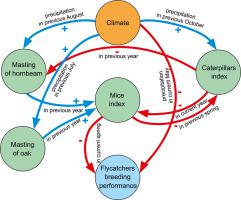Science of the Total Environment ( IF 8.2 ) Pub Date : 2020-08-31 , DOI: 10.1016/j.scitotenv.2020.142084 Dorota Czeszczewik , Patryk Czortek , Bogdan Jaroszewicz , Karol Zub , Patryk Rowiński , Wiesław Walankiewicz

|
Forest habitats change significantly under the influence of global warming. It is important to predict the effects of these changes, especially in primeval forests which currently represent a small percentage of temperate forests. Such changes often manifest themselves in an acceleration of the frequency of mass seeding of trees, which causes cascading effects in various organisms. We evaluated changes in: tree masts (oak Quercus robur and hornbeam Carpinus betulus), rodent abundance (yellow-necked mouse Apodemus flavicollis), folivorous caterpillar abundance (winter moth Operophtera brumata), and the breeding success of a cavity-nesting songbird (collared flycatcher Ficedula albicollis) in over a 30-year period in the Białowieża Forest (E Poland). We also analysed temperature, precipitation and snow cover to determine the effects of weather on each trophic level. Previous studies have exposed the indirect effect of tree masting on songbirds breeding in open nests. Our study uniquely highlights the relationships between trees, rodents, caterpillars, and a cavity-nesting bird. Precipitation was positively correlated with the fructification of trees, abundance of caterpillars, and the breeding losses of flycatchers (in July, August, October in the previous year, in May in the current year, respectively). We found that along with the changing climate, the frequency of mast years of oak increased, which caused an increasing frequency of rodent outbreaks. The abundance of mice was positively correlated with the predation on flycatcher broods (current year) and negatively - with the abundance of caterpillars (following year). We predict that current global trends in climate change will have a negative impact on the flycatcher due to the cascading effects from the above species. Bearing in mind that F. albicollis is one of the most numerous bird species, it can be assumed that more frequent masting will result in substantial changes in the entire bird assemblage, and presumably also other groups of animals.
中文翻译:

气候变化对原始森林中树的肥大和森林鸣鸟的繁殖性能具有连锁效应
在全球变暖的影响下,森林栖息地发生了巨大变化。重要的是要预测这些变化的影响,尤其是在目前仅占温带森林一小部分的原始森林中。这种变化通常表现为树木大量播种频率的加快,这导致了各种生物体的级联效应。我们评估了以下方面的变化:桅杆(橡树栎和角树Carpinus betulus),啮齿动物的丰度(黄颈老鼠Apodemus flavicollis),叶状毛毛虫的丰度(冬季飞蛾Operophtera brumata)以及繁殖成功(有腔巢的鸣鸟)捕蝇器Ficedula albicollis)在Białowieża森林(波兰E)中工作了30多年。我们还分析了温度,降水和积雪,以确定天气对每个营养级别的影响。先前的研究已经揭示了树肥大对间接鸟巢繁殖的间接影响。我们的研究独特地强调了树木,啮齿动物,毛毛虫和窝巢鸟之间的关系。降水与树木的结实,毛虫的数量以及捕蝇器的繁殖损失呈正相关(分别于去年的7月,8月,10月和当年的5月)。我们发现,随着气候的变化,橡树肥大年的频率增加,这导致啮齿动物暴发的频率增加。小鼠的丰度与捕蝇窝的捕食呈正相关(当年),与毛虫的丰度呈负相关(随年)。我们预测,由于上述物种的连锁效应,当前全球气候变化趋势将对捕蝇器产生负面影响。请记住F. albicollis是数量最多的鸟类之一,可以假定,频繁的交配会导致整个鸟类组合以及其他动物类别的实质性变化。


















































 京公网安备 11010802027423号
京公网安备 11010802027423号